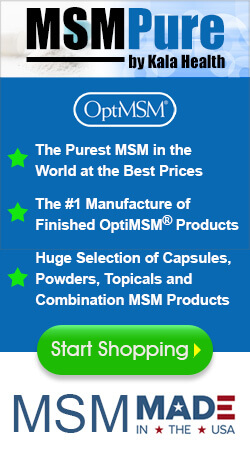Is MSM Natural or Synthetic?
Resolving the Controversy
by Alexander G. Schauss, Ph.D.
Updated by Ronald J. Breteler, Ph.D.
There is controversy In the industry about the question of whether methylsulfonylmethane (also known as dimethyl sulfate or MSM is a “natural” or “synthetic” product. In some ingredient directories, MSM is listed as either natural or synthetic. How could the same product be both? By understanding how MSM is manufactured, one can answer the question.
MSM is a simple molecule that contains eleven atoms bonded into one configuration. There are no isomeric forms. MSM that is manufactured by humans is indistinguishable from the MSM found in nature. It is important to understand how MSM is made in nature to appreciate the similarity between this process and how chemical engineers have learned to produce MSM. Microscopic phytoplankton living in the oceans eventually die and begin to decompose. As the biomass decays, it gives oil a highly odoriferous compound called dimethylsulfide (DMS). This gas is highly volatile and taken up by our atmosphere. Samples of air taken at various elevations in our atmosphere record the presence of DMS.
Both oxygen and sunlight react with DMS; that causes DMS to go through a series of oxidation steps that include the formation of dimethylsulfoxide (DMSO), methylsulfonylmethane (MSM) and other sulfates. Studies on how clouds form have demonstrated that microscopic particles of sulfate are required for water vapor in the atmosphere to form clouds. The water droplets “absorb” DMSO and MSM since both are highly soluble in water. Eventually, when the clouds release their water droplets as rain, trace amounts of these compounds drop to the Earth to be used by plants or returned to the sea to repeat the process.
Plants and animals take in sulfur by using the MSM and other sulfur compounds that have come from the atmosphere. This process is essential for all life on this planet. One would therefore think that plants and microscopic animals would be an ideal “natural” source for MSM since they require it and concentrate it in their tissue and cells. Unfortunately, this is not possible since the amount of MSM in plant or animal cells is no more than a few parts per million, too little for commercial extraction. Hence, the only viable method for producing large commercial quantities of these life-giving sulfur compounds is by using chemical technology. Therefore, one can not buy “natural” MSM. It is not commercially possible to extract MSM from plants, just like it is not possible to extract gold from seawater even though a tiny quantity of gold is present in seawater. Instead, one must rely on chemical engineering and the skills of chemical engineers to produce commercial quantities of MSM.
How is MSM made?
All MSM is formed by catalytic reaction of hydrogen peroxide with DMSO. All DMSO is formed by reaction of nitrogentetroxide and oxygen with DMS. The oxygen atoms for these reactions come from the atmosphere, the same source used in nature.
DMS is currently made by the reaction of sulfur with natural gas (methane). Methyl alcohol made from natural gas is combined with sulfur in the form of hydrogen sulfide or carbon disulfide. In a vapor phase catalytic reaction to form DMS and methylmercaptan (MM). MM is primarily used to make the amino acid methionine, another dietary supplement. DMS is sold for various industrial uses or converted to DMSO.
Due to the volatility of sulfur compounds, only a single purpose facility can prevent any cross-contamination that might occur if other sulfur-containing products were produced at the same location. ONLY ONE manufacturer has such dedicated facilities: Bergstrom Nutrition (formerly Cardinal Nutrition), the maker of OptiMSM. Distillation processes prevent contamination including heavy metals and residual DMSO. Low moisture content helps prevent microbiological contamination and increases stability and shelf life.
In summary, nature does make MSM. However, the amount of MSM found in nature in cells as a source is on a scale so small that the only way to produce commercial quantities for human or veterinarian use is to rely on the manufacturing methods developed by chemical engineers. The process nature uses to produce MSM is rather similar to how humans produce it commercially. But MSM is not “natural,” rather it is a synthetic product. The confusion in qualifying the source of MSM as “natural” or “synthetic” comes from the fact that MSM is identical in structure whether it comes from the factory or is found in nature.
Petrochemical (Fossil Fuel) Source vs. Pine Tree (Lignin) Source
Certain unscrupulous marketers have been very successful in spreading the rumor on the Internet that MSM is made either from “dirty” petrochemicals (“fossil fuel source”) or from “clean” lignin (“pine tree source”). This is a blatant falsehood.
In the past, an alternate method for manufacturing DMSO was used by Gaylord Chemical LLC which combined sulfur with paper mill pulping liquids to make DMS. Sulfur was added to black liquor and heated to about 460 F under high pressure. The black liquor was burned in a recovery boiler to dispose of the remaining organic material from the wood and to reclaim the inorganic chemicals for recycle to make fresh pulping liquor. Crude DMS was purified by a series of extraction and distillation steps to make a product for sale or conversion to DMSO. Gaylord Chemical LLC was the only DMSO manufacturer in the world that utilized the black liquor process. They shut down their plant in Bogalusa, LA., which was located next to a paper mill, in October 2010 to relocate to Tuscaloosa AL. Their new facility uses hydrogen sulfide and methanol as the raw materials to make DMS which is then used to manufacture DMSO.
Currently all DMSO produced worldwide is manufactured utilizing methanol and hydrogen sulfide as the raw material reactants to produce the dimethyl sulfide which is then being oxidized into DMSO. Based on information gathered from direct contact with the four major DMSO manufacturers in the world no plant-based source of methyl groups is being utilized for DMSO synthesis.
Reprinted with permission from Bergstrom Nutrition, Inc.





